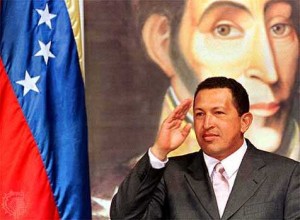Bolívar and Chávez: A Worthy Comparison?
In South America, Simón Bolívar is the equivalent of George Washington on steroids; every single Founding Father conglomerated into the Great Liberator. The country Bolivia, Venezuelan bolívares, countless street names, and a myriad of statues are understandably named for this independence hero. Therefore, Venezuelan President Hugo Chávez’s choice to name his particular brand of socialism as Bolivarian is not surprising. Gratuitous references to Bolívar’s legacy are used as a tool by Chávez to gain the popular support necessary to ensure the continuation of his agenda.
The recent move by Chávez to exhume Bolívar’s 200 year-old body seems to be in character for the Venezuelan leader, especially given the recent exhumations of Allende and Neruda. Chávez does not hold the general belief that Bolívar succumbed to tuberculosis. Instead, he conjectures that Bolívar was murdered by Colombians, who he accuses of historically selling out to the Spanish empire. Although official texts confirm that Bolívar died of tuberculosis before he could sail to Europe in exile, Chávez has dismissed this evidence as a cover up. Venezuela and Colombia are already not on the best of terms, especially given Colombia’s close ties to the U.S. Chávez’s accusatory rhetoric serves only to highlight the tensions in their relationship.
In July, Venezuelan scientists concluded their inquiry into the cause of death. After a careful and thorough investigation, the results were inconclusive. Yet, Chávez remained undeterred, expressing that even though the mystery may never be resolved, he still stands by his belief that Bolivar was killed by Colombian “traitors.” The ambiguity stems in part from the high levels of arsenic found in Bolívar’s body. While doctors see the presence of this toxin as a treatment for tuberculosis, Chávez alleges it was used instead as a poisoning agent. Much of Chávez’s reasoning stems from a doctor at Johns Hopkins University, Paul Auwaerter, who claimed that Bolivar did not display all the symptoms of TB. Chávez has put a lot of stake into this observation, but Auwaerter contests that Chávez is misconstruing his statements to signify murder, rather than some form of primitive medicine.
As the Northern Andean region moves forward, it has not forgotten its fiery independence. Unfortunately, Bolívar’s legacy has at times been used as a political tool to muster support for social movements that the revolutionary would not have necessarily supported. Bolívar himself traveled with Adam Smith’s The Wealth of Nations by his side, whereas Chávez supports state-run industries and decries free market capitalism as almost a matter of religious faith. Also, the Venezuelan president’s anti-American rhetoric does not readily play into Bolívar’s historical and ideological legacy as much as Chávez would have it appear. Although Bolívar disagreed with the practice of slavery and sought a uniquely Spanish American brand of democratic governance, he was a great admirer of the American Revolution and its founding fathers.
Chávez has not been exactly subtle about his agenda. Regardless of Bolívar’s actual political ideology, Chávez presents himself as a natural successor to the anti-colonial leader. He views himself as this generation’s chosen force to unite South America against a common external enemy. Flanked by allies such as Evo Morales, Daniel Ortega, and Rafael Correa, Chávez aspires to become the commander of a different version of Gran Colombia. For Bolívar, the Spanish Empire was the primary threat to Latin America’s independence, for Húgo Chávez it is the imperial ambitions of the United States. By invoking Bolívar, Chávez can foment nationalist sentiment to secure political support for his ideas.
Chavez often construes Bolivar in such a way that makes him appear as his karmic reincarnation. By resurrecting this immensely respected champion of Latin American independence, Chavez is attempting to mobilize electoral support that has waned in recent years. Weakened by cancer, his reverence for Bolivar may also be a means of reinvigorating the public’s perception of his strength. With his popularity hanging at an anemic 50%, Chávez will need immense fortitude in the coming year, as Venezuela’s presidential elections approach. Using Bolívar as a larger than life inspiration, Chávez tries to maintain his role as 21st Century Socialism’s irreplaceable leader.
Written by COHA Research Associate Amy Bratzel
This is the second issue in a series that will explore the concept of the New Latin America by focusing on recent developments that highlight how the region contrasts with its past.


